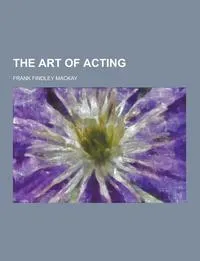The Art of Acting
Автор: Frank Findley MacKay
Переплёт: Мягкая обложка
📕 This historic book may have numerous typos and missing text. Purchasers can usually download a free scanned copy of the original book (without typos) from the publisher. Not indexed. Not illustrated. 1913 edition. Excerpt: ... T) Y the use of the word "expression," in defining the art of acting, we understand a result arising from combining all the elementary principles of artificial and natural language, and their presentation or sending out, for an effect, which effect should be a true, visible and auricular picture of the author's mental conceptions. Articulation and pronunciation are merely the mechanism of expression, the absolutely necessary machinery by which the thoughts and sensations of the mind are conveyed to the sense of hearing. The more perfect this machinery, the more certain the effect of the emotion. But whether it be the rage of anger or of grief, the shout of joy, the murmur of happiness, the wail of despair, or the merriment of laughter--whatever the emotion or the phase of emotion--it must be recognized through the factors of expression; and however great or small the dissimilarity in emotions, the difference in expression always results from a transposition of the modes of utterance, the qualities of the voice, the force of the voice, the stress, the time, and the inflections of the voice, just as the forms of grammar and the figures of rhetoric result from the position and transposition of words and phrases in a sentence. Grammar, rhetoric and logic are intellectual arts; so is acting an intellectual art; but, while in the study of the first three arts named, we are to consider only the rational processes, in acting we are to study feeling--that is, sensation as it appears by the various emotions. Through the science of grammar, rhetoric and logic, we learn from words the true conceptions of the author; through the science of emotions we vitalize those conceptions; and by the art of acting we re-present them in dramatic characters....
Мнения
